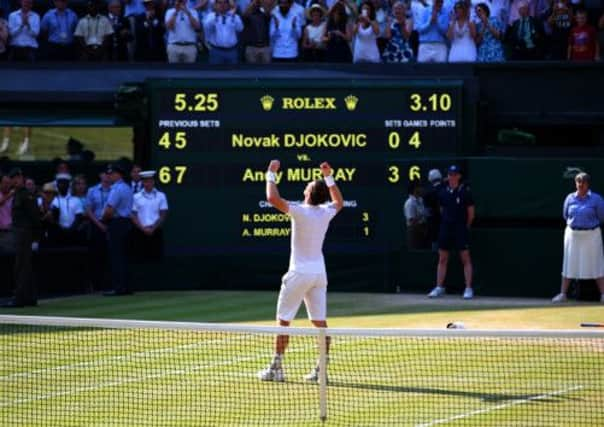Andy Murray’s Wimbledon win is triumph of character


And seldom has such immortality been more richly deserved than for Andy Murray. His progress to a brilliant championship triumph, culminating in a dramatic final game with no less than four championship points, was marked by outstanding skill, athleticism and staying power. But above all it was a triumph of character against the toughest opponents in the game. At critical moments, when his opponents had put him under pressure, Murray was able to summon reserves of stamina and willpower: an uncanny ability to turn adversity into triumph when it mattered. Throughout, he put on displays of dazzling skill and professionalism helped in no small measure by the coaching of Ivan Lendl.
Murray’s triumph over number one seed Novak Djokovic was celebrated, not only by astonishing numbers of enthusiastic spectators willing him on at the final yesterday, but by millions watching on television nationwide, marking as it did the first time in 77 years that the Wimbledon men’s singles title has been won by a home contestant. Many had long written off our ability to field a player capable of taking on and beating the world’s best. But they reckoned without the quality, strength – and true grit – of Murray.
Advertisement
Hide AdAdvertisement
Hide AdHis triumph in a contest played in blazing heat and marked by long, closely fought games, was no stroke of good fortune. Murray’s moment has been many years in the making. Coming on top of his Olympic final win last summer, which was followed by his first Grand Slam victory at the US Open, it has taken arduous dedication and training from an early age to lead him to achieve what has been the holy grail for generations of British tennis players.
That alone is an important lesson for those aspiring to follow him – and indeed, for all in competitive sport. For every game he played, nail-biting to a painful degree, was a demonstration of top-class skill and sportsmanship. Little wonder he has shot to the status of national hero.
Both the Prime Minister, David Cameron, and Scotland’s First Minister, Alex Salmond, had cause to cheer loud and long yesterday. It is immensely pleasing to see a Scot reach such a pinnacle and his accomplishment celebrated around the world.
And for a country mired for so long in stagnation and adversity, it has provided a much-needed morale-lifting moment, and at a pivotal time. Andy Murray has not only lifted the Wimbledon trophy, but also the mood of the nation.
A farce that must never be repeated
It has taken a succession of British home secretaries eight gruelling years to pack the radical cleric Abu Qatada on a plane to Jordan. While his long-delayed departure is welcome, it is absurdly overdue.
First arrested in the UK over suspected terror connections in 2001, his deportation has been held up by long procedural delays and layer after layer of legal appeals, often lodged at the last minute, and involving the European Court of Human Rights. It was finally able to proceed after the UK secured a legal treaty with Jordan agreeing that evidence obtained through torture would not be used against him.
And judging by the immediate reaction of the Jordanian authorities, the UK is by no means alone in its concerns over Qatada. The military prosecutors there have charged him with conspiracy to carry out terrorist acts – relating to a plot to bomb American and Israeli tourists during Jordan’s millennium celebrations. He has been remanded in custody and taken to prison.
Notwithstanding this Palestinian-Jordanian cleric’s right to a fair trial, eight years is a ridiculously long time for this matter to have been resolved in Britain and the cost to taxpayers adds a further insult. Qatada was long recognised here as persona non grata. And subsequent terrorist actions and threats have affirmed the prime duty of the state to guard its citizens, not only against the perpetrators of such attacks but their apologists who preach religious hatred.
Advertisement
Hide AdAdvertisement
Hide AdHow ironic that such deference was shown to the European Court while other signatories on the continent would have wasted no time in marching such characters on to an outward-bound plane.
Home Secretary Theresa May now needs to ensure such a farce is never repeated. She has promised to streamline deportation processes in future, “make sense of our human rights laws and remove the many layers of appeals available to foreign nationals we want to deport”. That means standing up to the lobbyists and special interest groups that have made such a meal of defending Qatada’s “human rights” at colossal risk – and expense – to the rest of us.
These pledges must now be followed by firm action.